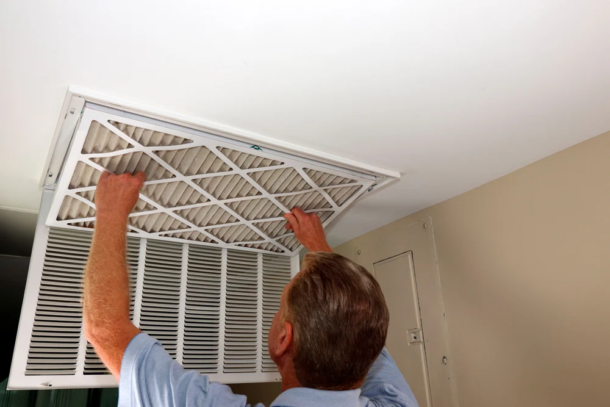A clean shower drain is essential for keeping your bathroom running smoothly. Over time, soap scum, hair, and other debris can build up on the drain cover, leading to a clogged shower drain. When a drain becomes clogged, water can back up, leaving you with a mess and an unpleasant experience. Luckily, cleaning your shower Read more
Whats New
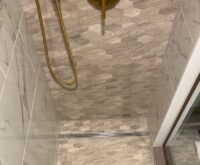
A clean shower drain is essential for keeping your bathroom running smoothly. Over time, soap scum, hair, and other debris can build up on the drain cover, leading to a clogged shower drain. When a drain becomes clogged, water can back up, leaving you with a mess and an unpleasant experience.
Luckily, cleaning your shower drain cover regularly is a simple task that can prevent clogs and keep your bathroom in tip-top shape.
Why It’s Important to Clean Your Shower Drain Cover
Keeping your shower drain cover clean helps prevent clogs and ensures that your shower drains water efficiently. If you neglect cleaning the drain cover, hair and soap residue can build up, causing the water to flow slowly or not drain at all. This can lead to larger plumbing issues, including the need for expensive repairs. Regular cleaning not only helps avoid these issues but also extends the life of your plumbing.
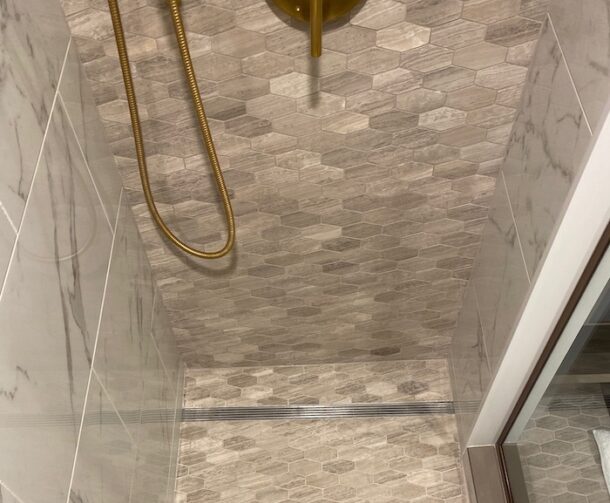
Materials Need for Cleaning Your Drain Cover
Gather the necessary tools to make the cleaning process easier and more effective. You’ll need a screwdriver for unscrewing the drain cover, rubber gloves, a small brush, baking soda, white vinegar, a drain snake for tougher clogs, a bucket or container to catch debris, and a cloth or rag for wiping down the cover.
How to Effectively Clean Your Shower Drain Cover and Prevent Clogs
Cleaning your shower drain cover is a simple yet important task to avoid clogs and ensure smooth water flow. Regular maintenance can help keep your shower functioning properly, prevent backups, and save you from costly plumbing repairs. Follow these steps to clean the cover and maintain a clog-free shower drain:
Removing the Drain Cover for Cleaning
Begin by removing the drain cover carefully. Depending on the type of cover, you may need a screwdriver to unscrew it, or you can simply lift it off if it’s the non-screwed variety. Place the cover in a safe spot to avoid damaging it during the process.
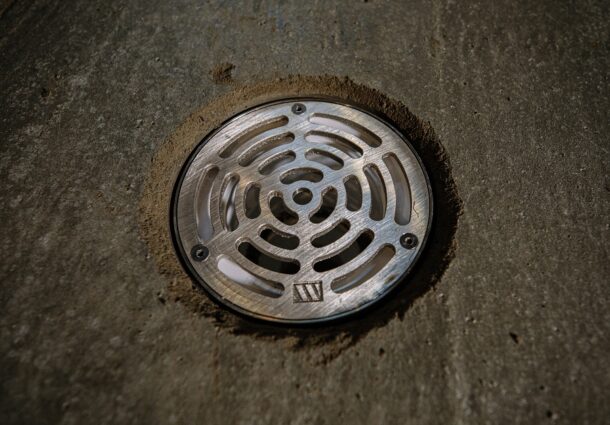
Clearing Visible Debris and Build-Up
After removing the drain cover, inspect the area for visible debris, including hair, soap scum, or grime. Wear rubber gloves to protect your hands and pull out any debris you can reach. Use a small brush, like an old toothbrush, to scrub off any stubborn build-up on the drain and the cover itself.
Thoroughly Clean the Drain Cover
Once the debris is removed, focus on cleaning the drain cover. Scrub it using warm, soapy water, and apply baking soda followed by vinegar to remove tough grime. Let the mixture sit for a few minutes, then scrub it well to ensure every corner is clean. Rinse thoroughly under warm water.
Cleaning the Drain Pipes for Future Prevention
While the cover is off, clean the drain pipes to avoid any future blockages. Use a brush to scrub the inside of the drain and remove soap scum, mold, or mildew. For deeper clogs, use a drain snake to clear out trapped debris and hair in the pipes, ensuring smooth water flow.
Reattaching the Cleaned Drain Cover
Once everything is clean, carefully reattach the drain cover. If screws were involved, tighten them without overtightening to avoid damage. Ensure the cover fits snugly and is properly aligned to prevent water from leaking through gaps and to ensure that your drain works efficiently.
Why It’s Important to Address a Clogged Shower Drain Quickly
Ignoring a clogged drain can lead to serious issues beyond just inconvenience. As the blockage worsens, it can cause water damage, promote mold growth, and create unpleasant odors in your bathroom. Over time, the problem may escalate, requiring professional plumbing services, which can be costly and time-consuming. For more detailed instructions, check out this blog on clogged shower drain by Rocklin Plumbing, which offers step-by-step techniques and expert advice on clearing blockages. Regularly cleaning and maintaining your shower drain cover is a simple way to avoid these complications and keep your shower functioning properly.
If your shower is having drainage issues, it’s important to address the problem quickly to prevent further complications. One effective method to clear the blockage is using a drain snake to remove hair and debris. If the snake doesn’t work, try pouring a mixture of baking soda and vinegar down the drain, letting it sit for 15 minutes, and then rinsing with hot water. These steps can often clear the blockage without needing professional help.
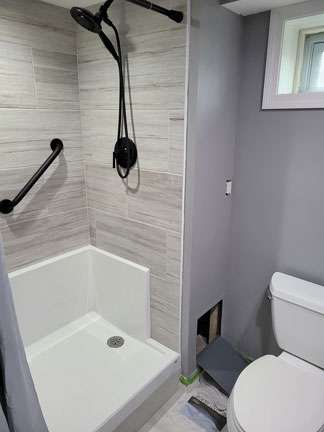
What Are the Signs of a Clogged Shower Drain
A clogged shower drain can be tricky to detect early, but some clear signs can help you identify the issue before it gets worse. Recognizing these signs early can save you from more serious plumbing problems and prevent the need for expensive repairs.
Keep an eye out for any unusual behavior in your shower to avoid a clogged drain. Here are a few signs to watch out for:
- Slow Drainage: If you notice that the water isn’t draining as quickly as usual, there might be a blockage somewhere.
- Unpleasant Odors: Standing water can lead to bad odors in your shower area. This might indicate that your drain is partially clogged.
- Gurgling Sounds: If you hear gurgling noises when you use the shower, it could be a sign that air is trapped in the pipes due to a clog.
- Water Backups: The most obvious sign of a clogged shower drain is when water starts to back up in the shower, possibly even overflowing.
Conclusion
Cleaning your shower drain cover regularly is a simple yet important task for maintaining a clean and functional bathroom. By following these steps, you can easily remove hair, soap scum, and other debris that could lead to a clogged shower drain.
Regular maintenance prevents clogs and ensures your shower works properly. Remember to clean the drain cover every 1 to 2 months, or more often if needed, to keep your bathroom in top shape and avoid costly plumbing repairs.

Student campuses are a hidden gem for plumbing businesses. Unlike individual apartments or private homes, campuses come with unique challenges and opportunities that make them a worthwhile investment for your business. With their high-density facilities, campuses require robust plumbing systems to handle the daily demands of hundreds or even thousands of students. By partnering with Read more
Student campuses are a hidden gem for plumbing businesses. Unlike individual apartments or private homes, campuses come with unique challenges and opportunities that make them a worthwhile investment for your business. With their high-density facilities, campuses require robust plumbing systems to handle the daily demands of hundreds or even thousands of students. By partnering with a campus, you can offer large-scale services while building long-term relationships that benefit both parties.
Campuses are distinct from apartment complexes in one crucial way: as a plumber, you’re not working unit by unit. Instead, you’re managing a complex, interconnected plumbing system for the entire building or group of buildings. This gives you better access to the source of issues and lets you address problems more efficiently. Partnering with a campus means not just fixing leaks. It means streamlining operations and securing steady, reliable income for your business.

Why Students Cause Plumbing Challenges
Students are often inexperienced when it comes to handling plumbing systems. They may misuse drains, flush inappropriate items, or ignore small issues until they escalate. Parties and gatherings also put extra strain on pipes, toilets, and sinks, leading to frequent clogs or breakdowns. These behaviors, while not surprising, create a higher demand for plumbing services compared to single-family homes or apartments.
Because of this, campuses see more wear and tear on their systems. Pipes get clogged more often, toilets overwork, and showers handle constant use. For plumbers, this translates into an ongoing need for maintenance, repairs, and even system upgrades. A campus isn’t just a one-time client; it’s a recurring source of business with varied and interesting challenges.
Tailoring Plumbing Services for Campus Needs
Campuses don’t need the same services as single households. Their requirements are more demanding, both in volume and urgency. Emergency repairs can’t wait when the problem affects dozens or hundreds of people at once. Downtime in shared facilities leads to complaints, so campuses often need fast, reliable solutions.
Your services can include regular maintenance schedules to keep systems running smoothly, emergency availability for urgent repairs, and consulting for long-term upgrades. Offering tailored solutions, like high-capacity water heaters or durable fixtures, shows campuses that your business understands their specific needs. This sets you apart from other plumbing services and builds trust.
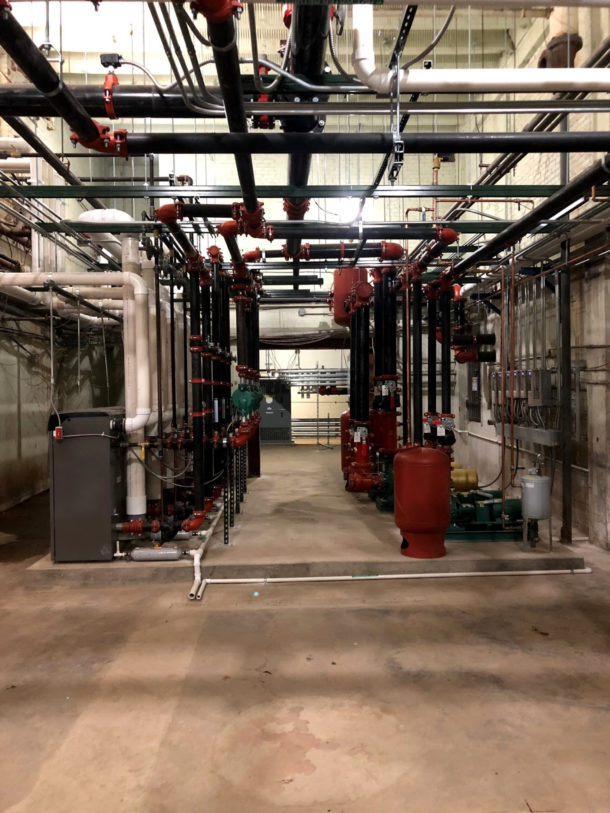
Addressing Common Shower Issues
Showers are one of the most heavily used fixtures on student campuses, and their constant use leads to frequent problems that require professional attention. Understanding these common issues highlights why plumbers play a critical role in maintaining campus facilities.
Hair and soap scum are the main culprits behind clogged shower drains. With hundreds of students using the facilities daily, these clogs accumulate quickly, leading to standing water and slow drainage. Regular maintenance and professional cleaning are essential to keep the system flowing.
Uneven water pressure is another common complaint on campuses. Old or poorly maintained pipes can restrict water flow, causing frustration for users. A plumber can identify and resolve these pressure issues, often by cleaning or replacing problem pipes.
Showerheads and taps that drip continuously waste water and inflate utility costs. These leaks often result from worn-out washers or seals, problems that a professional plumber can fix quickly to prevent further waste.
Inconsistent hot water is a frequent issue in high-demand settings. Outdated water heaters or overworked systems struggle to keep up, leaving students with cold showers. Upgrading water heaters or installing high-capacity systems ensures consistent temperatures for all users.
As a plumber, you can do more than just repair clogs. You can act as a consultant in designing showers for campuses, helping campuses choose durable, high-efficiency showerheads and systems that reduce water waste and lower utility bills. This adds value to your services and positions your business as a long-term partner rather than just an emergency solution.
The Role of Washing Machines on Campuses
Washing machines are a vital part of campus life, offering students convenient access to laundry facilities. However, their constant use by hundreds of residents creates unique plumbing challenges that require professional expertise.
Washing machines on campuses often face drainage issues due to blockages or overuse. Lint, detergent residue, and small clothing items can clog drains, leading to backups or flooding. A plumber ensures proper drainage by clearing blockages and maintaining pipes regularly.
Heavy daily usage increases the risk of leaks and overflows. Students may overload machines or use improper detergent, causing water to spill. Addressing these issues promptly minimizes water damage and prevents larger plumbing failures.
Campus washing machines work harder than residential ones, leading to faster wear on hoses, seals, and connections. Routine inspections and repairs by a plumber keep the machines running efficiently and avoid sudden breakdowns.
You can help by ensuring proper installation, maintaining drainage systems, and fixing any plumbing issues quickly. Beyond repairs, you can offer guidance on selecting washers. Top load washer models, for example, are often ideal for high-demand settings. They handle larger loads, are generally easier to maintain, and have fewer mechanical components prone to failure compared to front-loaders. Your expertise can make a significant difference in the efficiency and reliability of these facilities.
Tackling Kitchen Plumbing Challenges
Campus kitchens, whether shared communal spaces or private facilities in dormitories, face significant plumbing challenges due to heavy daily use. These high-demand environments require a plumber’s expertise to keep systems running smoothly and to handle issues promptly.
Food particles, grease, and other debris often get washed down sinks, causing blockages that disrupt the entire kitchen. Unlike in homes, where blockages might only inconvenience one family, clogged drains in campus kitchens can halt activities for dozens of students. Plumbers are essential for clearing these blockages and installing preventative measures, such as grease traps, to reduce future problems.
Constant use accelerates the wear and tear on pipes, leading to leaks or corrosion over time. Damaged pipes can result in water damage or even health hazards if left untreated. Regular inspections and maintenance by a plumber ensure the longevity of these systems.
Dripping faucets and loose connections are common in busy kitchens. While these may seem minor, they waste water and increase utility bills. A plumber can quickly fix or replace faulty fixtures, ensuring the kitchen operates efficiently.
When plumbing issues arise in kitchens, they often require immediate attention. A burst pipe or overflowing sink can disrupt meals and cause stress for both students and campus staff. Having a reliable plumber on call ensures swift resolutions, minimizing downtime and inconvenience.
Being on call for kitchen plumbing needs shows campuses that you’re a reliable partner. Routine maintenance, emergency repairs, and advice on upgrades ensure kitchens remain functional and student-friendly. Offering solutions like grease traps or durable piping can also help campuses manage long-term costs and reduce maintenance frequency.
Handling Toilet Troubles
Toilets on student campuses endure relentless use, making them some of the most high-maintenance fixtures in any facility. Their constant operation, combined with the behaviors of inexperienced users, leads to frequent plumbing challenges that require professional expertise.
Clogs are among the most common issues in campus toilets. Students often flush items that shouldn’t go down the drain, such as wet wipes, sanitary products, or even paper towels. These blockages can affect entire bathroom facilities, disrupting dozens of residents. A plumber ensures quick unclogging and can recommend measures like installing signage or flush-friendly fixtures to minimize future issues.
Leaky toilet tanks or continuously running toilets are major water wasters. These problems often stem from worn-out flappers, loose connections, or malfunctioning flush mechanisms. A plumber can address these issues promptly, reducing water bills and preventing further damage to the plumbing system.
Constant use accelerates wear on toilet fixtures, leading to loose handles, cracked seats, or malfunctioning parts. Regular maintenance and timely replacements keep toilets in good working order, ensuring reliability for students.
An overflowing toilet is more than an inconvenience—it’s a hygiene and safety hazard, especially in shared facilities. Blockages, high water pressure, or malfunctioning flush valves often cause this issue. A skilled plumber can address the root cause quickly to restore functionality and prevent property damage.
As an emergency plumber, your ability to respond quickly is vital. But beyond emergency services, you can offer consulting to help campuses invest in durable, low-maintenance toilets that can handle high traffic. Advising on renovations or system upgrades also positions your business as an expert in long-term solutions.
Inspiring the Next Generation of Plumbers
Working with campuses isn’t just about pipes and fixtures—it’s also an opportunity to engage with students. Young people are often exploring career paths, and your presence on campus can highlight the benefits of the plumbing industry. Whether it’s through direct interaction or simply showcasing your work, you have the chance to inspire future plumbers.
Additionally, students often have visiting friends or family members who may require plumbing services off-campus. Your visibility on campus can lead to referrals and expand your client base further. This makes campus partnerships an investment not just in the present but also in the future of your business and the industry as a whole.
Partnering with student campuses is a smart move for plumbing businesses. The steady demand, variety of challenges, and potential for long-term growth make it a win-win situation.
If you’re looking to grow your plumbing business while making a meaningful impact, student campuses are the perfect place to start.

Extreme weather doesn’t just mess with your weekend plans. It disrupts everything—homes, roads, businesses. If you’ve ever faced a system failure during a heatwave or a cold snap, you are well aware of the havoc bad weather can wreak on your daily operations. As of November 2024, the U.S. has already seen 24 weather and Read more
Extreme weather doesn’t just mess with your weekend plans. It disrupts everything—homes, roads, businesses. If you’ve ever faced a system failure during a heatwave or a cold snap, you are well aware of the havoc bad weather can wreak on your daily operations.
As of November 2024, the U.S. has already seen 24 weather and climate disasters, each causing over $1 billion in losses. We’re talking storms, wildfires, and even the kind of winter blasts that freeze everything in their path.
Now, add to that the pressure extreme weather puts on your commercial HVAC system. When temperatures soar or plummet, your system has to work overtime. The result? Long downtime, enormous repair bills, general discomfort – everything that you could do without.
If you run a business that heavily relies on HVAC systems, you are at just the right place. In this segment, we are about to discuss some practical ways to protect your commercial HVAC system during a severe hailstorm or heatwave.
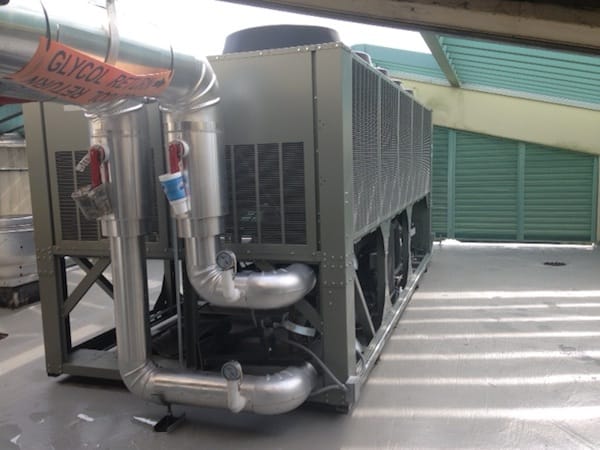
Schedule Regular HVAC Maintenance
It’s easy to forget about your HVAC system until something goes wrong. But when extreme weather hits, you need your system to work without a hitch. Regular maintenance is the best way to make sure your HVAC is ready for anything.
If your HVAC servicing is long overdue, act fast. You’d want to have a professional check it out before the weather turns. They’ll clean and inspect your system thoroughly. If they detect any issue, they can make immediate repairs. This can save you a lot of trouble when the temperature drops or spikes.
If you fail to catch the problem on time, you might have to install a brand new system. With the prices of HVAC equipment relentlessly soaring up, that’s the last thing you want.
In case you don’t have an HVAC service provider on your speed dial already, find one ASAP.
Tips on How to Find a Reliable Commercial HVAC Technician:
Look for a company with experience handling the kind of load your system carries. Commercial systems are bigger and more complex than residential ones, so the technician should be able to manage the specific needs of your setup.
Nothing beats a good old-fashioned word-of-mouth referral. Talk to your fellow local business owners for quality leads. Online reviews and ratings can give you a sense of a company’s reputation but don’t trust them blindly. Try to get feedback from clients with similar-sized operations.
Very important: Don’t forget to confirm if the provider offers 24/7 emergency support, especially when extreme weather strikes. If you are in one of the cities where extreme weather events are common, finding them is easy. New Jersey is an example, being cited as one of the fastest-warming states in the US by the New York Times.
Here’s some good advice from a New Jersey HVAC contractor: always make sure your technician is using OEM-grade parts when making repairs or replacements. Why? OEM parts are made specifically for your system, which means they work better and last longer.
According to Exclusive HVAC Services, upgrading HVAC appliances with OEM parts can significantly boost efficiency and overall lifespan. Most importantly, quality parts can handle fluctuations in temperature, humidity, and power surges a lot better than those without.
Install Surge Protectors
Power surges are expected when a heavy storm rolls in. These sudden spikes in electrical current can fry your HVAC components. Thankfully, you can protect your system from voltage fluctuations by simply installing a surge protector.
This device will act as your first line of defense against catastrophic weather events. Surge protectors act like a safety net for your HVAC. They absorb excess voltage that can happen during storms or power outages.
Without them, that surge could overload the electrical circuits in your HVAC unit, damaging sensitive parts like the compressor or the control board. With a surge protector, the excess energy is diverted safely, protecting the system from harm.
Smaller fluctuations in voltage can also stress your HVAC appliances over time, causing wear and tear.
Err on the side of caution by installing a commercial-grade surge protector to safeguard your system from both large spikes and subtle electrical disturbances. While they come with a high upfront cost, it’s nothing compared to the price of buying a whole new HVAC system.
Upgrade Insulation and Seal the Leaks
All HVAC appliances rely on a controlled environment to function properly, and insulation plays a huge role in that. Without proper insulation and sealing, your system ends up losing heated or cooled air, making it work twice as hard.
This extra strain equals higher utility bills. And as if this isn’t bad enough, it can lead to unexpected failures during extreme weather.
Start with your ducts. Leaky ducts are a common issue in commercial setups. Check for any cracks, loose connections, or visible gaps where air could escape. Sealing these with a reliable duct sealant or foil tape can stop energy loss and improve airflow.
Now, move on to the pipes. Adding pipe insulation helps reduce energy transfer, meaning hot water stays hot in winter, and cool air stays cool in summer. This is especially important in freezing climates, where uninsulated pipes risk bursting when temperatures drop.
Upgrading insulation doesn’t cost much and can effectively protect your HVAC system when the weather is at its worst. Add this task to your checklist today, if you haven’t already.
Time to Weatherproof Your HVAC!
As a business owner, you have enough on your plate. Taking simple steps to protect your HVAC system means you won’t have to deal with unnecessary issues when the weather goes awry. HVAC breakdowns reflect poorly on you as a business runner. So, if you want to avoid unnecessary expenditure and operational disruptions, you know exactly what to do.
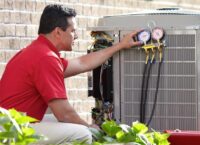
Maintaining a comfortable and energy-efficient home relies heavily on the performance of your HVAC (Heating, Ventilation, and Air Conditioning) system. Regular residential HVAC maintenance not only improves indoor air quality and comfort but also extends the system’s lifespan, reduces energy bills, and prevents costly repairs. Let’s explore the many advantages of routine HVAC care and Read more
Maintaining a comfortable and energy-efficient home relies heavily on the performance of your HVAC (Heating, Ventilation, and Air Conditioning) system. Regular residential HVAC maintenance not only improves indoor air quality and comfort but also extends the system’s lifespan, reduces energy bills, and prevents costly repairs. Let’s explore the many advantages of routine HVAC care and why it’s an essential investment for homeowners.
What Is Residential HVAC Maintenance?
Residential HVAC maintenance involves regular inspections, cleanings, and tune-ups of your heating and cooling systems. A professional technician performs these tasks to ensure that all components function correctly, identifying potential issues before they escalate into major problems. Regular maintenance helps keep your HVAC system running efficiently throughout the year, providing consistent temperature control for your home.
Maintenance typically includes checking the following:
- Air filters
- Thermostats
- Condenser and evaporator coils
- Ductwork
- Electrical connections
- Refrigerant levels
- Blower components
Key Benefits of Regular Residential HVAC Maintenance
Investing in regular HVAC maintenance offers numerous benefits that can enhance your home’s comfort, safety, and cost efficiency.
1. Improved Energy Efficiency
When an HVAC system is clean and properly maintained, it operates more efficiently. Dirty filters, clogged ducts, or worn-out parts can force the system to work harder, using more energy to heat or cool your home. Regular maintenance ensures that all parts are clean and in good working order, reducing the system’s energy consumption. An energy-efficient HVAC system lowers your utility bills, providing savings that quickly offset the cost of maintenance.
2. Extended System Lifespan
An HVAC system that undergoes regular maintenance is more likely to reach its full lifespan, which can be 10-15 years for most units. By addressing minor issues before they lead to serious damage, you can avoid premature breakdowns and extend the life of your system. Regular tune-ups help prevent wear and tear on key components, keeping your HVAC unit in top condition year-round.
3. Improved Indoor Air Quality
Your HVAC system is responsible for circulating air throughout your home. When filters and ducts are clean, your home benefits from improved indoor air quality, which is crucial for your family’s health. Dirty filters can harbor dust, allergens, and pollutants that can exacerbate respiratory issues and allergies. During maintenance, technicians replace filters and clean ducts, ensuring that your system circulates clean, healthy air.
4. Consistent Home Comfort
A well-maintained HVAC system provides consistent airflow and temperature control. Whether it’s keeping your home cool in the summer or warm in the winter, regular maintenance ensures that your system runs smoothly without interruptions. Routine inspections help identify and correct any issues that could affect airflow or temperature regulation, allowing you to enjoy a comfortable home environment year-round.
5. Reduced Risk of Emergency Repairs
Unexpected HVAC breakdowns can be stressful and expensive. Regular residential HVAC maintenance helps you avoid these emergencies by identifying potential issues early. A professional technician can detect worn-out parts, refrigerant leaks, or electrical issues that could lead to a system failure if left untreated. This proactive approach reduces the likelihood of sudden malfunctions and the need for costly repairs.
How Often Should You Schedule HVAC Maintenance?
To maximize the benefits of your HVAC system, it’s recommended to schedule maintenance at least twice a year—once in the spring for your cooling system and once in the fall for your heating system. This ensures that your HVAC unit is ready for peak performance during the most demanding seasons. Regular maintenance visits typically include system inspections, cleaning, lubricating moving parts, checking thermostats, and ensuring that all components work efficiently.
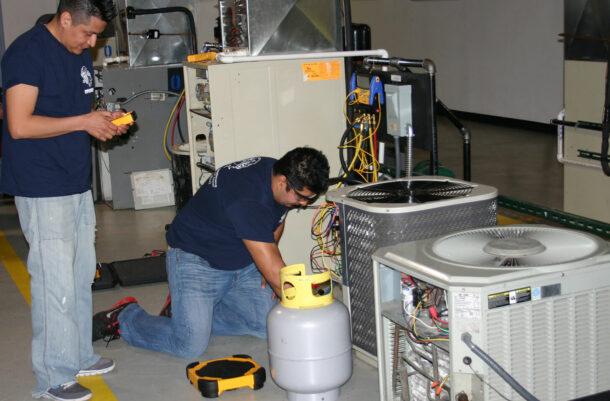
DIY Maintenance Tips for Homeowners
While professional HVAC maintenance is crucial, there are some simple steps homeowners can take to keep their system in good shape between service visits:
- Change Filters Regularly: Replace air filters every 1-3 months, depending on the type of filter and the amount of use. Clean filters ensure efficient airflow and prevent the system from overworking.
- Keep Outdoor Units Clear: Make sure the outdoor condenser unit is free from debris, leaves, or overgrown plants. This helps with airflow and prevents the system from overheating.
- Inspect Ducts for Leaks: Check ductwork for any visible leaks or damage. Sealing leaks can improve energy efficiency and airflow.
- Clean Vents and Registers: Regularly clean air vents and registers to prevent dust buildup and blockages, which can affect air distribution.
While these DIY steps can help maintain your system, they should not replace professional maintenance. A certified HVAC technician can perform a thorough inspection and identify issues that might not be visible to the untrained eye.
Signs Your HVAC System Needs Maintenance
Even with regular maintenance, there may be times when your HVAC system requires additional attention. Look out for these warning signs:
- Unusual Noises: Banging, clanking, or squealing sounds may indicate that something is wrong with your HVAC system.
- Inconsistent Temperatures: If some rooms in your home are hotter or colder than others, it may be a sign that your HVAC system is struggling.
- High Energy Bills: A sudden spike in your energy bills could be a result of your system running inefficiently.
- Weak Airflow: If your vents are barely blowing air, it’s a sign that your system needs servicing.
- Frequent Cycling: If your system is constantly turning on and off, it may have an issue that requires professional attention.
If you notice any of these signs, contact a professional HVAC technician for an inspection and repair.
Choosing the Right Residential HVAC Maintenance Service
When selecting an HVAC maintenance service, consider the following:
- Experience and Certification: Choose a service provider with experience and proper certification to ensure that your system is in qualified hands.
- Customer Reviews: Look for positive reviews and testimonials from previous customers to gauge the reliability and quality of service.
- Comprehensive Services: A good maintenance provider should offer a range of services, from inspections and cleanings to repairs and replacements.
- Transparent Pricing: Choose a company that offers clear, upfront pricing with no hidden fees.
If you’re searching for a dependable HVAC service, check out Super Brothers’ residential HVAC maintenance to keep your system running efficiently and safely.
Conclusion
Regular residential HVAC maintenance is an essential investment that keeps your system running efficiently, reduces energy costs, and ensures consistent comfort in your home. By choosing Super Brothers for your HVAC needs in California, you can rest assured that your system will be well-maintained by experienced professionals. Contact us today to schedule your maintenance appointment and enjoy the long-term benefits of a healthy, efficient HVAC system.
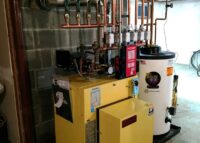
As environmental awareness grows and energy costs rise, choosing an efficient and dependable oil heating system becomes the top priority for homeowners. To make an informed decision, several factors must be considered, such as the local climate, house size, and insulation. In US households, heating costs have risen by about 40 percent from 2022 to Read more
As environmental awareness grows and energy costs rise, choosing an efficient and dependable oil heating system becomes the top priority for homeowners.
To make an informed decision, several factors must be considered, such as the local climate, house size, and insulation.
In US households, heating costs have risen by about 40 percent from 2022 to 2023, and continue to increase, according to Forbes. This makes the case for installing the right heating system that is efficient and reliable.
There are multiple options available, and it can be difficult to determine which system best meets your needs.
We look at some key factors to consider when choosing an oil heating system, such as comfort, energy efficiency, and cost savings.
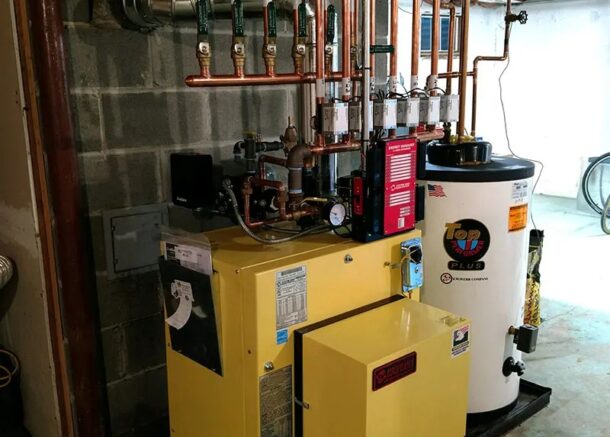
Accessing Your Home Heating Needs
Understanding your heating needs is the first step in selecting the appropriate oil heating system. The size of your home and the quality of the insulation are important considerations when selecting the right system.
Colder regions, for example, may require larger-capacity systems. Well-insulated homes can benefit from systems that operate at lower outputs while maintaining comfort.
When we conduct this basic assessment, we are able to select a system that meets your household needs while avoiding unnecessary energy costs.
Understanding the Types of Oil Heating Systems
There are around three primary types of oil heating systems, each having its own unique benefits.
- Standard oil boilers are durable and have effective heat distribution. These systems are a reliable choice for steady home heating.
- High-efficiency oil boilers, which are built for energy savings, convert more fuel into heat due to their high-efficiency systems. Systems like these high-efficiency oil heating systems offer excellent energy efficiency. This makes them ideal for environmentally conscious homeowners.
- Combination oil boilers provide both space, heating, and hot water in one compact system. This can be a convenient solution for homes that have limited space.
When deciding on the type, take into account your household’s specific needs and energy usage habits. For example, if lowering fuel costs is a top priority, high-efficiency models offer a higher ROI.
Evaluating Energy, Efficiency, and Environmental Impact
According to a 2023 survey, almost 67 percent of U.S. adults are seeking sustainable features in homes. They are willing to implement some actionable measures to achieve this goal.
Energy efficiency is one of the most critical factors when selecting an oil heating system. High-efficiency systems can reduce fuel consumption and emissions, which is what is in demand for eco-friendly home solutions. This is achieved by capturing more of the heat generated during the combustion process. This heat would have otherwise escaped through vents and gone to waste.
Energy Kinetics recommends these advanced, high-efficiency oil heating systems because of their reduced environmental impact and energy savings. The systems maximize fuel use and minimize wastage. This means a greener, more sustainable choice while keeping your utility bills low.
Considering Your Installation and Maintenance Costs
The upfront cost of an oil heating system is anywhere between $9,000 and $16,000, depending on the model and home size. The operational expenses and maintenance can also add up over time. High-efficiency systems require more initial investmentbut tend to be more cost-effective in the long run. This is due to reduced fuel consumption and lower emissions.
The system size and compatibility also matter. Selecting the right size eating system is crucial because if it’s too small, it can struggle to eat in your home, and we also don’t want energy wastage or uneven heating.
Many professionals offer heating load assessments that calculate the optimal system size based on your home specifications. This ensures that the unit that you choose will work efficiently with the existing home infrastructure.
Features for Enhanced Comfort
Modern oil heating systems have a variety of features for convenience and comfort.
- Zone heating: this feature divides your home into heating zones and enables targeted heating in specific areas.
- Smart thermostats: Pairing your heating system with a smart thermostat can provide greater control of indoor temperatures and allow you to adjust the settings remotely.
- Quiet operation: High-efficiency models are also engineered for a silent operation. This is important when there is a requirement for minimal noise.
Government Incentives and Rebates
Check if your area offers financial incentives or tax credits for homeowners who install energy-efficient heating systems. These can make the system more affordable and rewarding for those who want to help the environment. According to the official website, the tax credit can be up to $3200.
Making the Right Choice for Your Home and Budget
As we see, choosing the right oil heating system requires careful consideration of the budget and your home’s unique needs. There are numerous options designed to provide reliable and eco-friendly heating.
Investing in an efficient oil heating system is not just about comfort but also a step towards a more sustainable home. The right choice made today can help you for decades to come.

